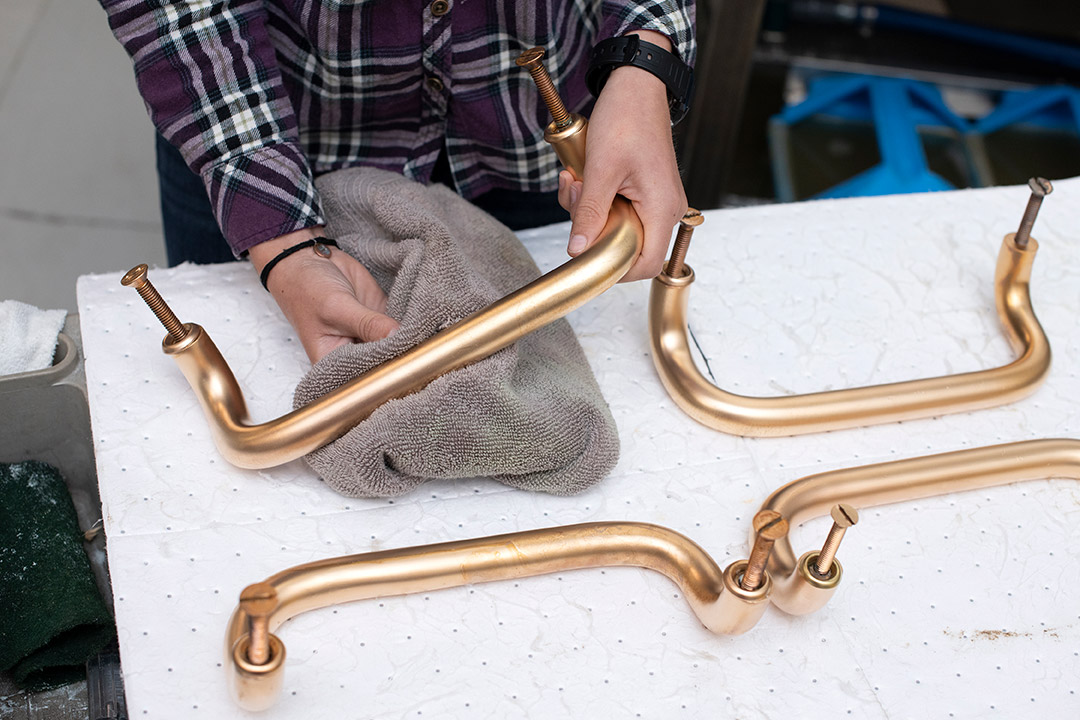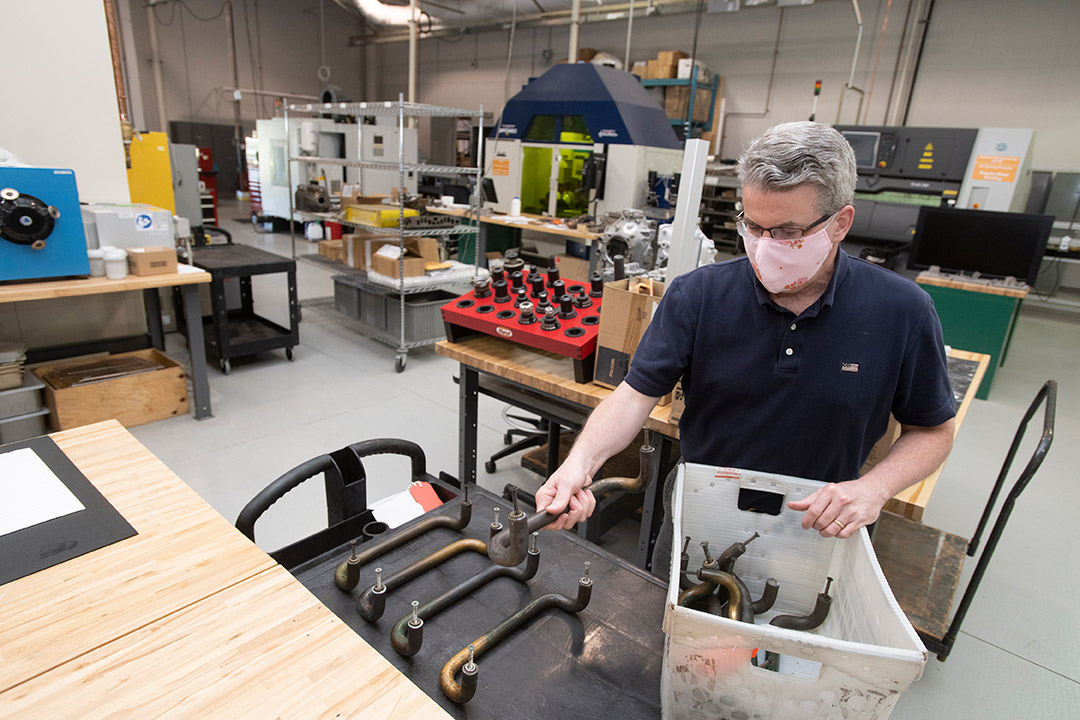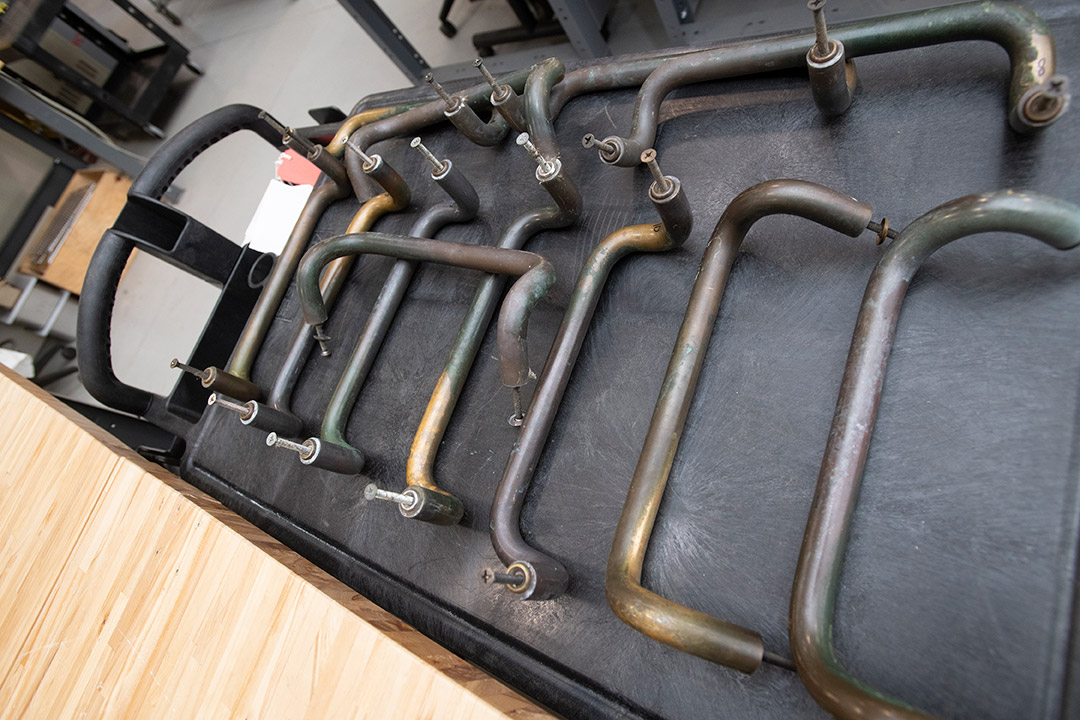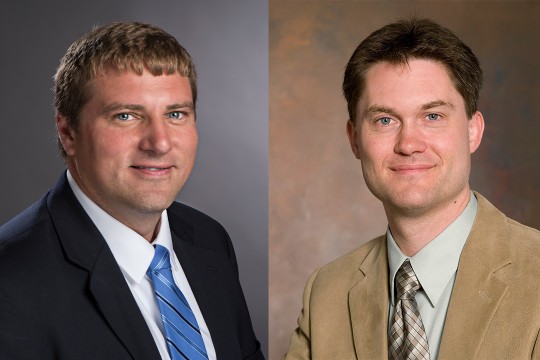RIT researchers use collaborative approach to help get a handle on pandemic
GIS, CIMS lead project to clean hundreds of door pulls on campus to help inhibit spread of virus
A. Sue Weisler
A team of researchers from the Golisano Institute for Sustainability and the Center for Integrated Manufacturing Studies conducted testing on door pull handles (shown here after cleaning) installed as part of infrastructure upgrades to prepare the RIT campus for the fall semester. This is a safety measure to prevent the spread of the COVID-19 infection on campus.
Soon after the coronavirus outbreak last spring, RIT researchers supporting the response to curb the COVID-19 outbreak in New York state learned of a fascinating property of copper and the metal’s alloys.
“They act to kill bacteria and viruses on surfaces,” said Gerry Hurley ’93 (industrial engineering), ’96 ME (engineering management), a technical program manager in the Center for Integrated Manufacturing Studies (CIMS) and the Golisano Institute for Sustainability (GIS).
A. Sue Weisler
A team of researchers from the Golisano Institute for Sustainability and the Center for Integrated Manufacturing Studies, including Gerry Hurley (pictured here), conducted testing on door pull handles installed as part of infrastructure upgrades to prepare the RIT campus for the fall semester. This is a safety measure to prevent the spread of the COVID-19 infection on campus.
Hurley credited Jim Watters, senior vice president for Finance and Administration, with generating the idea to look into copper handles based on an article he read.
“The research demonstrated that copper and some copper alloys kill 99.9 percent of several common bacteria within two hours,” Hurley added, “and that pure copper was shown to kill the SARS-CoV-2—which causes COVID-19—in four hours.”
Moving quickly to apply how the study’s key learnings could help inhibit the spread of the novel coronavirus across RIT’s sprawling main campus, the research team reached out to Dave Harris, director of Training, Utilities and Environmental Management in Facilities Management Services (FMS) “to figure out how we could help them get the campus and all its buildings ready to reopen safely,” Hurley said.
“We needed to identify the most efficient methods to leverage copper’s germ-fighting properties on high-touch surfaces such as door handles and pulls,” he added.
Working under extremely tight deadlines, the team evaluated 360 mostly exterior door handles from more than 40 campus buildings to determine their metallic makeup. When the copper content was verified, the team cleaned the handles using a specialized slurry blast machine from Wet Technologies Inc., whose president and founder is RIT alumnus Frederick Greis ’84 (manufacturing technology).
A. Sue Weisler
A team of researchers from the Golisano Institute for Sustainability and the Center for Integrated Manufacturing Studies conducted testing on door pull handles (shown here before cleaning) installed as part of infrastructure upgrades to prepare the RIT campus for the fall semester. This is a safety measure to prevent the spread of the COVID-19 infection on campus.
“The slurry blaster is a low-pressure, high volume, high concentration, closed loop wet blast system that uses highly engineered ceramics and other similar materials to clean or finish part surfaces to ‘like new’ condition,” Hurley said.
He likened the process of removing materials impeding the surface copper on the door handles to workers removing the green oxidation on the Statue of Liberty. According to the research engineer, surface copper on the old and aged door handles measured as low as 79 percent before cleaning; after cleaning, the copper content increased markedly to 89 percent.
“The higher the copper content, the more effective the surface is at killing germs on the handles,” he said, “with 89 percent or more copper being the most effective.”
To successfully complete the project, RIT capitalized on its long legacy and expertise in materials analysis, materials testing, cleaning systems, and manufacturing engineering. “We recently expanded those capabilities with expansion of the Remanufacturing Testbed, which brought slurry blasting and other cutting-edge technologies to campus,” Hurley observed.
Greis noted that his company’s slurry blasting equipment has been utilized in “hundreds of systems in dozens of industrial applications” since Wet Technologies was founded in 1999. He’s particularly proud that RIT researchers have applied it to help stop the spread of COVID-19.
“RIT has really run with the technology and the work has demonstrated that it can inhibit the life of the COVID-19 virus,” Greis said. “Those handles see a lot of human contact. I am sure I used them at least 1,000 times going to school there.”
Jason Purvee, one of the initiative’s co-op students, said his work on the project demonstrated to him how, in times of need, people can come together to create positive outcomes.
“All of those cleaned copper door handles have the potential to make the campus safer for my peers, my professors, and other faculty and staff,” said Purvee, a fourth-year mechanical engineering student from Rochester, N.Y. “That is definitely is what is most important.”















